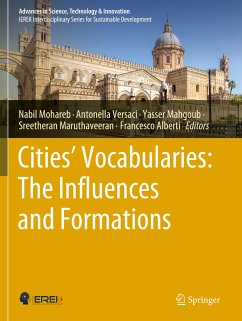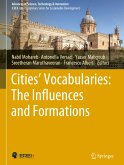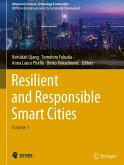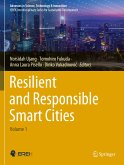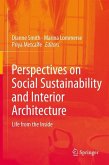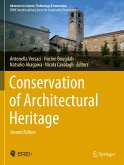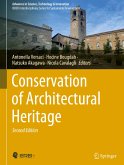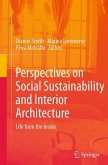Cities' Vocabularies: The Influences and Formations
Herausgegeben:Mohareb, Nabil; Versaci, Antonella; Mahgoub, Yasser; Maruthaveeran, Sreetheran; Alberti, Francesco
Cities' Vocabularies: The Influences and Formations
Herausgegeben:Mohareb, Nabil; Versaci, Antonella; Mahgoub, Yasser; Maruthaveeran, Sreetheran; Alberti, Francesco
- Broschiertes Buch
- Merkliste
- Auf die Merkliste
- Bewerten Bewerten
- Teilen
- Produkt teilen
- Produkterinnerung
- Produkterinnerung
This book discusses several topics regarding different vocabularies, such as sacred architecture, heritage buildings, open spaces, landmarks, and street escapes, all of which have a direct influence on the city form. The city form is also affected by the indirect impact of the citizens themselves, for example their culture, which in turn depends on the arts, as can be seen and embodied in morals, paintings, media, digital art, and sculpture. The book also examines the fundamental elements that are responsible for the identity of the city. Presenting case studies that demonstrate the how…mehr
Andere Kunden interessierten sich auch für
![Cities' Vocabularies: The Influences and Formations Cities' Vocabularies: The Influences and Formations]() Cities' Vocabularies: The Influences and Formations186,99 €
Cities' Vocabularies: The Influences and Formations186,99 €![Resilient and Responsible Smart Cities Resilient and Responsible Smart Cities]() Resilient and Responsible Smart Cities241,99 €
Resilient and Responsible Smart Cities241,99 €![Resilient and Responsible Smart Cities Resilient and Responsible Smart Cities]() Resilient and Responsible Smart Cities241,99 €
Resilient and Responsible Smart Cities241,99 €![Perspectives on Social Sustainability and Interior Architecture Perspectives on Social Sustainability and Interior Architecture]() Perspectives on Social Sustainability and Interior Architecture41,99 €
Perspectives on Social Sustainability and Interior Architecture41,99 €![Conservation of Architectural Heritage Conservation of Architectural Heritage]() Conservation of Architectural Heritage161,99 €
Conservation of Architectural Heritage161,99 €![Conservation of Architectural Heritage Conservation of Architectural Heritage]() Conservation of Architectural Heritage161,99 €
Conservation of Architectural Heritage161,99 €![Perspectives on Social Sustainability and Interior Architecture Perspectives on Social Sustainability and Interior Architecture]() Perspectives on Social Sustainability and Interior Architecture41,99 €
Perspectives on Social Sustainability and Interior Architecture41,99 €-
-
-
This book discusses several topics regarding different vocabularies, such as sacred architecture, heritage buildings, open spaces, landmarks, and street escapes, all of which have a direct influence on the city form. The city form is also affected by the indirect impact of the citizens themselves, for example their culture, which in turn depends on the arts, as can be seen and embodied in morals, paintings, media, digital art, and sculpture. The book also examines the fundamental elements that are responsible for the identity of the city.
Presenting case studies that demonstrate the how implementing the concept of the responsibility of architecture and arts affects the development of our cities, the book offers a new approach that is based on the available features of a city and explores how planners and decision-makers can use these features to address the myriad problems that our cities are facing.
Presenting case studies that demonstrate the how implementing the concept of the responsibility of architecture and arts affects the development of our cities, the book offers a new approach that is based on the available features of a city and explores how planners and decision-makers can use these features to address the myriad problems that our cities are facing.
Produktdetails
- Produktdetails
- Advances in Science, Technology & Innovation
- Verlag: Springer / Springer International Publishing / Springer, Berlin
- Artikelnr. des Verlages: 978-3-030-51963-6
- 1st edition 2021
- Seitenzahl: 356
- Erscheinungstermin: 24. Januar 2022
- Englisch
- Abmessung: 279mm x 210mm x 20mm
- Gewicht: 868g
- ISBN-13: 9783030519636
- ISBN-10: 3030519635
- Artikelnr.: 63212285
- Herstellerkennzeichnung Die Herstellerinformationen sind derzeit nicht verfügbar.
- Advances in Science, Technology & Innovation
- Verlag: Springer / Springer International Publishing / Springer, Berlin
- Artikelnr. des Verlages: 978-3-030-51963-6
- 1st edition 2021
- Seitenzahl: 356
- Erscheinungstermin: 24. Januar 2022
- Englisch
- Abmessung: 279mm x 210mm x 20mm
- Gewicht: 868g
- ISBN-13: 9783030519636
- ISBN-10: 3030519635
- Artikelnr.: 63212285
- Herstellerkennzeichnung Die Herstellerinformationen sind derzeit nicht verfügbar.
Dr. Nabil Mohareb Dr. Nabil Mohareb is an Associate Professor; he has more than eight years of administrative experience as the Director of Faculty branch of Architecture- Design & Built Environment in a newly established branch in Tripoli campus- Beirut Arab University, Lebanon. His research is focusing on the relationship between architecture and urbanism; he is interested in social behaviour activities, their mutual effect on both spatial and economic variables in urban spaces, and their interrelationship with architectural design using digital simulation in forecasting their movements and behaviour. He has developed and planned an area of personal research, which is reflected in his several published papers in refereed journals and international refereed conferences, in addition to the work of his postgraduate students. Dr. Nabil has participated in number of funding research related to understanding social behaviour activities. With regards to his teachingexperience, Dr. Nabil has worked for a number of distinguished universities in Egypt, United Arab Emirates and Lebanon. Over the past eighteen years of teaching experience, he has gained an understanding of dealing with multinational and multicultural environments. Recently, he is using 'Design-Build' method in post-graduate design studios to involve the students more with the construction industry (digitally and traditionally). Antonella Versaci Antonella Versaci is a researcher and assistant professor at the Faculty of Engineering and Architecture, University "Kore" of Enna, where she is responsible of the "Laboratory of Restoration of Architectural and Cultural Heritage" and teaches "architectural restoration" and "laboratory of architectural restoration" within the Master of Architecture. She is also an associate researcher at the Institut Parisien de Recherche Architecture Urbanistique Société (IPRAUS), a research laboratory of the ENSAPB - National Superior School of Architecture of Paris-Belleville (UMR 3329 Ausser). Her research applies to the issues of safeguarding and conservation of historic buildings and landscape, with particular attention to cultural heritage spread across the territory and to the protection of historic centers, as well as to their survey, diagnosis, classification and valorization. In 1996, she earned a master's degree in Building Engineering at the University of Messina and, the following year, obtained a scholarship for postgraduate specialization courses abroad. She then attended in Paris two courses of specialization in urban preservation, strategic planning and management earning both degrees. In 2005, she received a PhD degree cum laude in "Architecture" from the University of Paris VIII, with a dissertation on the legislation on historic centers in France. From June 2004 to September 2008, she was a UNESCO International staff member, responsible for numerous cultural projects in Southeastern Europe, including those related to the creation of a School of Restoration in Tirana (Albania) and to a Center for Digitization of heritage cultural in Skopje (FYROM). She is the author of over 90 refereed publications. Dr. Yasser Mahgoub Dr. Yasser Mahgoub is the Chairman of the Department of Architecture and Urban Planning, College of Engineering, Qatar University. Received B.Sc. in Architectural Engineering from Ain Shams University, Cairo, Egypt in 1978 and Doctorate in Architecture from The University of Michigan, Ann Arbor, USA in 1990. He has held several academic positions since 1990 at Ain Shams University, United Arab Emirates University, Kuwait University and Qatar University. Practiced as a professional architect in Egypt and was a founding member in 1980 of "The Egyptian Designers" architectural firm in Cairo, Egypt. Practiced as an architect and consultant in Egypt, UAE, Kuwait and Qatar. Teaches architectural design studios, architectural research, environment, graduation projects and urban planning legislation and behavior in architecture and architectural professional practice. His research interests include social and cultural aspects of architecture, sustainable architecture, architectural education and the impact of globalization on architecture. Served as a scientific referee for many scientific conferences and journals. Attended and presented papers in several international and regional conferences. Practiced as a professional architect and consultant in Egypt, United Arab Emirates, Kuwait and Qatar. Was a member of the Agha Khan for Architecture Award reviewers for the 2010 cycle. Dr. Sreetheran Maruthaveeran Dr. Sreetheran Maruthaveeran is currently a Senior Lecturer at the Department of Landscape Architecture, Faculty of Design and Architecture, Universiti Putra Malaysia (UPM). He was a researcher at the Urban Forestry and Landscape Unit, Forest Research Institute Malaysia (FRIM) for 13 years before joining the academia. Sreetheran obtained his PhD from the University of Copenhagen, Denmark in Landscape Architecture and Planning. His research falls into a number of themes such as environmental behaviour, landscape visualisation, urban greening, urban forestry and arboriculture. His PhD work was on "fear of crime in urban parks in Kuala Lumpur". He is also keen in using visualization methods in his research. Sreetheran has been involved in a range of international networking and project activities. One of the highlight is the collaboration project between the Royal Veterinary and Agricultural University (KVL) and the University of Copenhagen, Denmark since 2007. The project entitled "Multipurpose Forestry in a Changing Society" has been funded by the Danish International Development Agency (DANIDA). Apart from the research, consultation projects particularly from the urban forestry and arboricultural perspectives such as tree risk assessment and inventory at golf courses, embassies and botanical gardens have also been conducted by him. Sreetheran has produced about 70 publications, including books, reviewed proceedings, journals and popular writing. He has two books to his credit namely Hazardous Trees (2009) and Seni Tanaman Hiasan Dalaman (2015). He has also vast experience as a reviewer for several journals such as Urban Forestry and Urban Greening, Journal of Landscape and Urban Planning, Journal of Tropical Forest Science, Forest Science and Pertanika Journal of Social Sciences and Humanities. He has reviewed several conference proceedings and school textbook at the national level. Sreetheran currently holds the position as the Deputy Coordinator for the Urban Forestry Section (6.07.00) under the International Union of Forest Research Organizations (IUFRO), Austria. He is also a Certified Arboristunder the International Society of Arboriculture (ISA), USA since 2007. Francesco Alberti Dr Francesco Alberti is Associate Professor of Urban Planning and design at the Department of Architecture of the University of Florence, where he is currently the coordinator of the Laboratory of Urban Design for the master's degree course in Urban and Regional Planning and in charge with the teachings of Urban Design for the Laboratory of Green Systems Planning for the master's degree course in Landscape Architecture and of Smart City Planning for the postgraduate programme "ABITA" (Bioecological Architecture and Technological Innovation for the Environment). In the same department, he is the scientific coordinator of the research unit "SUP&R" (Sustainable Urban Projects & Research) and of the related university spin-off "Urban LIFE" (Urban Liveability & Innovation for Everyone). As a member of the ItalianNational Institute of Urban Planning (INU - Istituto Nazionale di Urbanistica) he joined the National Commetees "Networks, Infrastructure and Innovation Policies" (2014-2016) and "Urban Accessibility for Everyone" (2016-). Since 2106 he is the President of the Regional division of INU in Tuscany. His scientific interests in the fields of spatial planning and urban design refer to an approach aimed at giving cultural coherence and operational continuity among research, education and public policies concerning city and territory, with a special focus on two main areas: - the relationship between urban planning, design and management in the perspective of sustainability and urban resilience; - the interpretation of mobility systems as "public spaces", playing a major role in structuring contemporary cities. On these topics he has written many essays, articles and books, joined national and international conferences, lectured in postgraduate programmes and master courses for professionalsand public administrators, provided expert help in participatory processes, coordinated seminars and conducted researches on behalf of public institutions and private enterprises.
Domestic Architecture and the City Identity:The Historic City of Homs and Its Traditional Courtyard Houses as a Case Study.- Dialogical Approach for the City identity: Examination of Beirut Central District Contemporary Architecture.- Identifying the Perceptual Image of Distinctive Places through Storytelling.- Improving Urban Contexts' Identity via Conducting a Smart Mechanism.- Analytical Study of The Visual Content of Khuwy's Tomb in Saqqara in Egypt.- Psycho-Social Impact of New-Communities Ads in Egypt on Impending Crime Rates.- Using Sonic Perception To Improve Public Spaces And Develop Place Identity.- Is It Possible To Define Architectural Identity More Objectively?.- Developing a Model for Evaluation of Heritage Urban Open-Air Museums: Applied to Al-Moez Street open-air Museum - Cairo.- Porous Images: Benjamin Reveals Naples.- The Impact of Identity in Determining the Characteristics of the Public Arts in Landscape.- The Reflection of Local Materials and Culture on Architecture: A Case Study of Harra.- Vernacular Architecture as an Expression of Cities' Identity: Gercüs Houses in Turkey.- How Can We Recover The Identity of The City? Workshops of "The City Of Tomorrow / A Vila Do Mañá".- Energy Efficiency in Architecture Design in Mohenjo-Daro.
Domestic Architecture and the City Identity:The Historic City of Homs and Its Traditional Courtyard Houses as a Case Study.- Dialogical Approach for the City identity: Examination of Beirut Central District Contemporary Architecture.- Identifying the Perceptual Image of Distinctive Places through Storytelling.- Improving Urban Contexts' Identity via Conducting a Smart Mechanism.- Analytical Study of The Visual Content of Khuwy's Tomb in Saqqara in Egypt.- Psycho-Social Impact of New-Communities Ads in Egypt on Impending Crime Rates.- Using Sonic Perception To Improve Public Spaces And Develop Place Identity.- Is It Possible To Define Architectural Identity More Objectively?.- Developing a Model for Evaluation of Heritage Urban Open-Air Museums: Applied to Al-Moez Street open-air Museum - Cairo.- Porous Images: Benjamin Reveals Naples.- The Impact of Identity in Determining the Characteristics of the Public Arts in Landscape.- The Reflection of Local Materials and Culture on Architecture: A Case Study of Harra.- Vernacular Architecture as an Expression of Cities' Identity: Gercüs Houses in Turkey.- How Can We Recover The Identity of The City? Workshops of "The City Of Tomorrow / A Vila Do Mañá".- Energy Efficiency in Architecture Design in Mohenjo-Daro.

